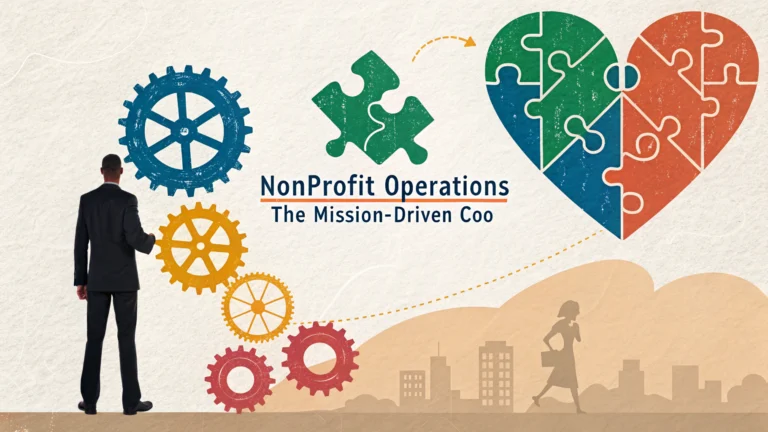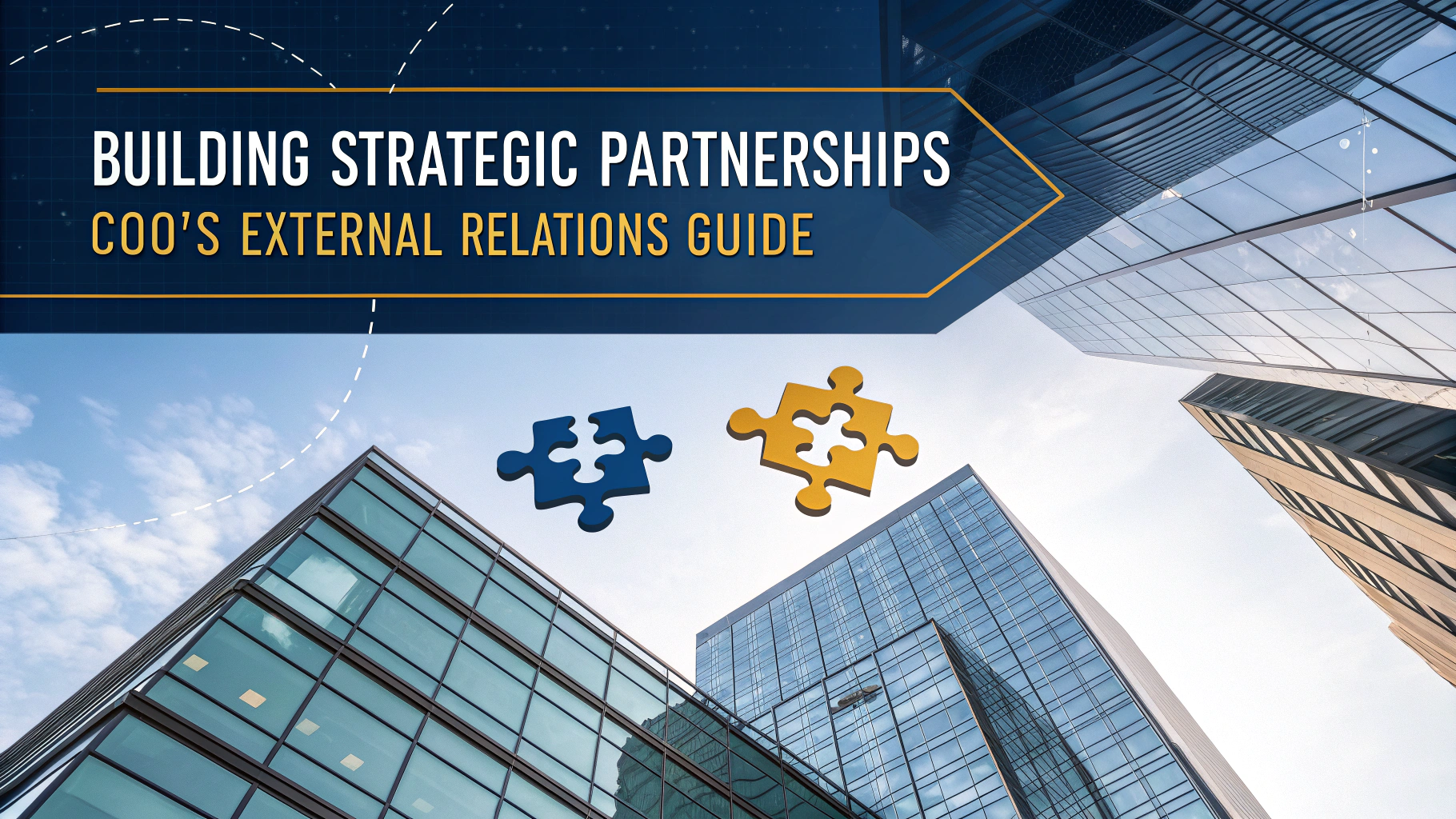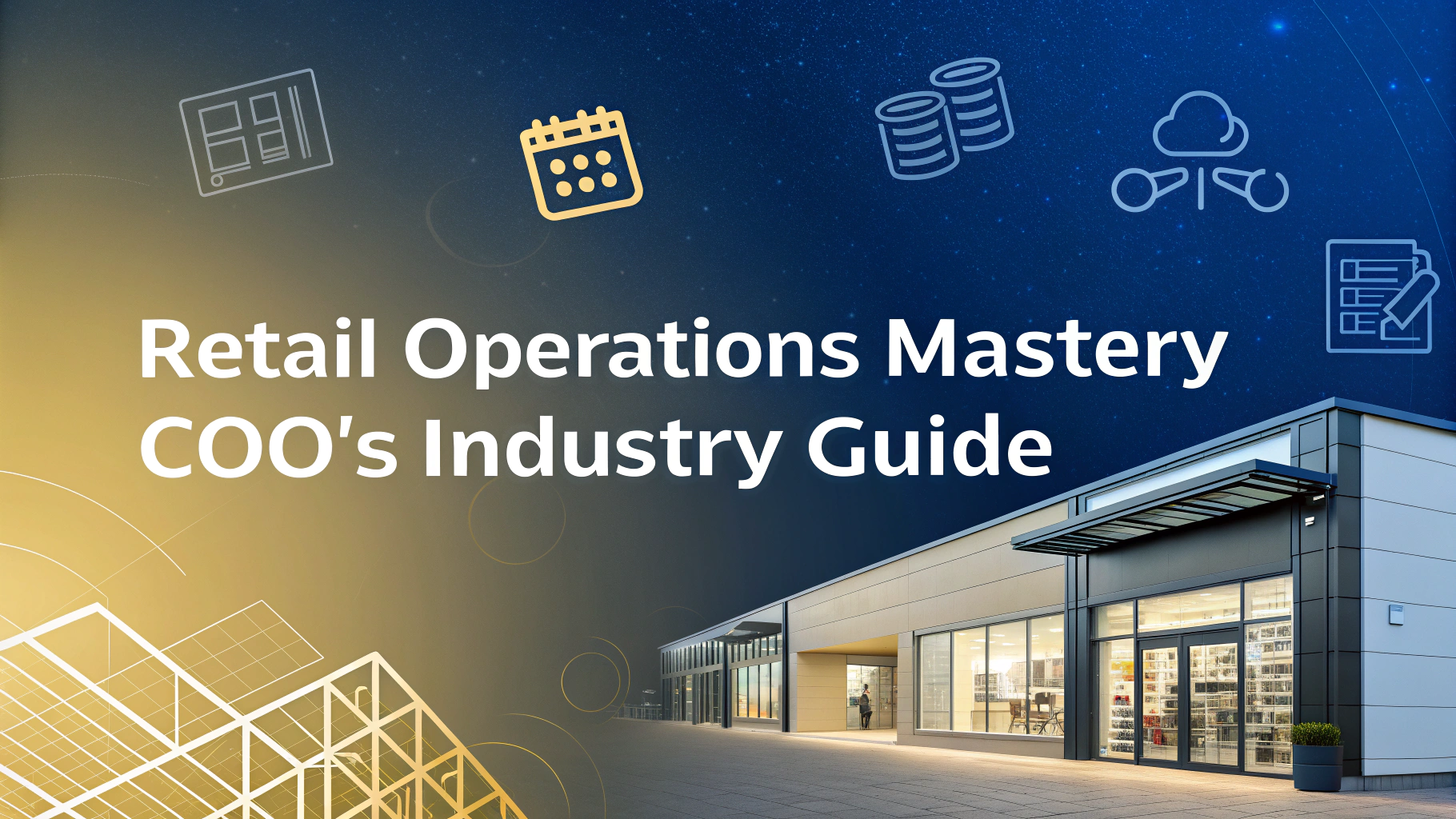A nonprofit Chief Operating Officer (COO) serves as the organizational backbone, bridging the gap between strategic vision and day-to-day execution.
Unlike their for-profit counterparts, nonprofit COOs must balance limited resources with unlimited community needs while maintaining the organization’s mission at the forefront of operations.
This guide explores the unique role of mission-driven COOs and provides practical strategies for success in nonprofit operations management.
Key Responsibilities of a Nonprofit COO
- Aligning operational decisions with mission objectives
- Managing financial resources and budget optimization
- Overseeing program delivery and impact measurement
- Developing and implementing organizational policies
- Coordinating between departments and stakeholders
- Ensuring regulatory compliance and reporting
Essential Skills for Success
A successful nonprofit COO combines business acumen with passionate mission advocacy.
- Financial Management: Budget planning, resource allocation, grant management
- Leadership: Team building, volunteer coordination, board relations
- Strategic Planning: Program development, impact assessment, growth planning
- Technology: Digital transformation, data analysis, systems integration
Resource Management Strategies
Efficient resource allocation requires creative problem-solving and strategic partnerships.
- Implement cost-saving measures without compromising program quality
- Develop diverse funding streams through grants and partnerships
- Create sustainable volunteer management systems
- Optimize staff roles and responsibilities
Performance Measurement Framework
| Area | Metrics |
|---|---|
| Program Impact | Beneficiaries served, outcomes achieved |
| Financial Health | Program costs, fundraising efficiency |
| Operational Efficiency | Resource utilization, service delivery time |
Technology Integration Tips
- Select nonprofit-specific software solutions for donor management and program tracking
- Implement cloud-based collaboration tools for remote teams
- Use data analytics for informed decision-making
- Maintain robust cybersecurity measures
Building Strong Partnerships
Successful nonprofit operations depend on strategic relationships with various stakeholders.
- Cultivate relationships with donors and funding organizations
- Develop partnerships with other nonprofits for resource sharing
- Engage community leaders and local businesses
- Maintain transparent communication with board members
Risk Management Essentials
- Create comprehensive insurance coverage plans
- Develop crisis management procedures
- Implement internal controls and audit processes
- Maintain compliance with regulatory requirements
Moving Forward: Your Next Steps
Start by assessing your current operational framework against these best practices.
Consider joining professional organizations like the Nonprofit Leadership Alliance or American Society of Association Executives for additional resources and networking opportunities.
Contact your local nonprofit resource center or visit National Council of Nonprofits for more guidance and support.
Staff Development and Training
Investing in human capital is crucial for long-term organizational success.
- Create comprehensive onboarding programs
- Provide ongoing professional development opportunities
- Implement mentorship programs
- Develop clear career advancement pathways
Change Management Strategies
- Communicate changes effectively across all levels
- Develop phased implementation plans
- Create feedback mechanisms for stakeholder input
- Monitor and adjust based on outcomes
Program Sustainability Planning
Long-term program viability requires careful planning and regular assessment.
- Develop program evaluation frameworks
- Create succession plans for key positions
- Build emergency funding reserves
- Establish scalable operational models
Innovation and Adaptation
Digital Transformation
- Embrace virtual service delivery methods
- Implement automated workflow systems
- Utilize artificial intelligence for data analysis
- Develop mobile-first communication strategies
Environmental Sustainability
- Implement green office practices
- Reduce carbon footprint in operations
- Create sustainable procurement policies
- Measure and report environmental impact
Empowering Mission-Driven Leadership
Transform your operational excellence into lasting social impact by implementing these strategies systematically. Focus on continuous improvement, stakeholder engagement, and mission alignment to create sustainable change in your community.
Remember that successful nonprofit operations require both heart and strategy. By balancing mission-driven purpose with operational efficiency, you can maximize your organization’s impact and create lasting positive change.
Stay connected with industry trends and continue building your professional network to ensure your organization remains at the forefront of nonprofit excellence.
FAQs
- What are the primary responsibilities of a nonprofit COO?
A nonprofit COO oversees daily operations, implements strategic plans, manages staff, ensures program effectiveness, oversees financial operations, maintains compliance, and supports the CEO in achieving the organization’s mission. - How does a nonprofit COO’s role differ from a for-profit COO?
A nonprofit COO focuses on mission-driven outcomes rather than profit maximization, manages multiple stakeholders including donors and volunteers, operates under stricter regulatory scrutiny, and often works with limited resources while maintaining program effectiveness. - What qualifications should a nonprofit COO possess?
A nonprofit COO typically needs a master’s degree in nonprofit management, business administration, or related field, 7-10 years of senior management experience, strong financial acumen, experience in program evaluation, and demonstrated leadership in mission-driven organizations. - How does a nonprofit COO measure organizational success?
Success is measured through program impact metrics, operational efficiency, stakeholder satisfaction, financial sustainability, compliance adherence, staff retention rates, and achievement of mission-related goals. - What is the relationship between a nonprofit COO and the Board of Directors?
The COO reports to the CEO but regularly interacts with the board through committee work, operational updates, strategic planning sessions, and ensuring alignment between operational execution and board-approved strategies. - How does a nonprofit COO manage resource allocation?
The COO prioritizes resources based on mission impact, develops efficient operational systems, implements cost-control measures, ensures proper budget management, and balances program needs with organizational capacity. - What role does the COO play in nonprofit compliance and risk management?
The COO ensures compliance with federal and state regulations, maintains proper documentation, oversees audit preparations, develops risk management strategies, and implements internal controls to protect the organization. - How does a nonprofit COO contribute to fundraising efforts?
The COO supports fundraising by providing operational data for grant applications, ensuring efficient use of donated funds, maintaining transparent reporting systems, and demonstrating program effectiveness to donors. - What technology considerations fall under a nonprofit COO’s purview?
The COO oversees technology infrastructure, implements digital transformation initiatives, ensures data security, selects appropriate nonprofit management software, and leverages technology for operational efficiency. - How does a nonprofit COO manage volunteer programs?
The COO develops volunteer management systems, ensures proper training and supervision, creates engagement strategies, measures volunteer impact, and integrates volunteer programs with overall operations.








